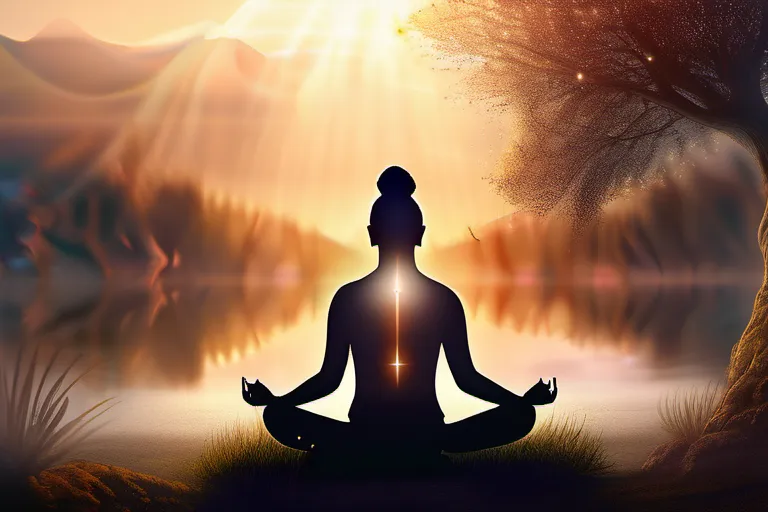Explore the philosophies, beliefs, and practices of non-theistic spirituality, its impact on personal growth, and its role in modern society.
Non-theistic spirituality is a diverse and growing movement that rejects the belief in a deity or higher power. In this article, we delve into the various philosophies, beliefs, and practices of non-theistic spirituality, its impact on personal growth, and its role in modern society.
Understanding Non-Theistic Spirituality
So, what exactly is non-theistic spirituality? Is it just about denying the existence of a higher power or gods? Or does it offer something more profound and transformative for those seeking meaning in life?
The term ‘non-theistic’ can be quite broad, encompassing various philosophies that focus on human experience without reliance on divine entities. One key aspect is its roots; many non-theistic spiritual practices have emerged from a deep dissatisfaction with the traditional religious structures and dogmas that often seem to overshadow personal growth and individual freedom.
Let’s dive into some of these philosophies. Take Atheism, for instance, which isn’t just about disbelief but also a way of understanding life through empirical evidence and reason. And then there’s Agnosticism, where the focus is more on the limits of human knowledge rather than outright denial.
Secular Humanism, another significant philosophy within non-theistic spirituality, advocates for ethical living based on human needs and values. It emphasizes scientific inquiry over religious beliefs, fostering a worldview that sees humanity as central to the universe’s purpose.
These philosophies often share a common thread: they encourage individuals to take an active role in shaping their own lives and understanding of existence, without the crutch of supernatural explanations. This can be seen as both liberating and challenging—liberating because one is not bound by strict religious doctrines, but challenging because it demands rigorous self-examination and personal responsibility.
But perhaps more than anything else, non-theistic spirituality challenges us to rethink our relationship with the world around us. It asks us to find meaning in everyday experiences, to cultivate compassion and empathy towards others, and to seek fulfillment through meaningful human interactions and achievements rather than divine intervention.
In essence, non-theistic spirituality is about reclaiming the power of personal experience and rational thought to guide our understanding of life’s complexities. It’s a quest for self-discovery that transcends traditional boundaries, offering a unique lens through which to view the world.
Key Beliefs and Practices
When delving into non-theistic spirituality, one can’t help but wonder how these philosophies and practices shape our understanding of life without reliance on a divine entity. Humanism, atheism, agnosticism, and secular humanism are just a few of the key beliefs that guide many in their pursuit of meaning and purpose.
Let’s start with humanism. It emphasizes the value and agency of human beings, advocating for ethical and moral principles based on human needs and experiences. Imagine life as a grand journey; humanism asks us to focus on our own steps and contributions rather than seeking guidance from a higher power.
Atheism, on the other hand, is rooted in disbelief or lack of belief in deities. This doesn’t mean atheism is devoid of spirituality—it often involves finding meaning through science, reason, and critical thinking. It’s like exploring life’s mysteries with an open mind, not just accepting answers handed down by tradition.
Agnosticism takes a different stance by questioning the knowability of the divine or spiritual realms. This belief system is often seen as a bridge between atheism and theism, suggesting that we don’t have enough evidence to make definitive claims about the existence of deities. It’s like walking through a foggy path; you can see only so far, but you continue to move forward with what little clarity you have.
Secular humanism, meanwhile, focuses on promoting values and principles that are beneficial for all humans without religious or supernatural beliefs. It’s about building a better world grounded in reason and empathy. Think of it as constructing a society where everyone’s well-being is paramount, not because of divine command but because it makes sense and feels right.
These diverse yet interconnected belief systems offer a rich tapestry of perspectives on life, personal growth, and the human condition. They challenge us to think critically about our beliefs and actions, encouraging a deeper connection with ourselves and others. In this journey, non-theistic spirituality becomes less about following external rules and more about living authentically and ethically.
So, what do you believe? How do these philosophies resonate with your own understanding of life? Are you ready to explore the depths of non-theistic spirituality and its profound impact on personal growth?
The Role of Non-Theistic Spirituality in Personal Growth
Can non-theistic spirituality really contribute to personal growth? It’s a question that often sparks debate, especially when we consider traditional spiritual paths that rely heavily on faith and belief in a higher power. But let’s delve into this idea further.
Imagine life as a vast garden, where each individual is a unique flower, growing under the sun but without needing a gardener to intervene directly. Non-theistic spirituality invites us to be our own gardeners, tending to the needs of our minds and souls with care and attention. Through practices like mindfulness, meditation, and ethical living, we can cultivate self-awareness and emotional intelligence.
Mindfulness is like walking barefoot in a lush forest; it allows us to experience every step deeply, grounding us in the present moment. By being mindful, we can observe our thoughts and emotions without judgment, gaining clarity about what truly matters in life. This heightened awareness can lead to better decision-making and a deeper connection with ourselves.
Meditation serves as a tool to quiet the mind, much like turning off the noise of a busy city street to hear the whispers of nature. Regular meditation practices help reduce stress and increase focus, fostering a state of inner peace that spills over into daily life. It’s about finding stillness in chaos, learning to listen to the quieter voices within.
Ethical living is akin to planting seeds of kindness and compassion in our community garden. By aligning our actions with principles of honesty, empathy, and respect, we build a stronger, more harmonious society. This doesn’t mean following someone else’s rules but rather finding our own path guided by what feels right.
Through these practices, non-theistic spirituality offers a profound pathway to personal growth. It challenges us to embrace responsibility for our own development while recognizing the interconnectedness of all beings. In this journey, we discover not just who we are, but how deeply connected and capable we truly are.
So, as you embark on your path, consider what it means to be a self-guided gardener in life’s vast garden. With mindfulness, meditation, and ethical living, non-theistic spirituality can indeed nurture personal growth, self-awareness, and emotional intelligence, leading us toward a more fulfilling existence.
Non-Theistic Spirituality and Modern Society
How does non-theistic spirituality shape our understanding and approach to modern society? In today’s fast-paced, often chaotic world, it offers a unique perspective on social justice, activism, and community building. Let’s explore how this path can foster positive change and meaningful connections in our communities.
Imagine a society where everyone embraces the ethos of non-theistic spirituality—where every individual is seen as a valuable member with inherent worth. This perspective challenges us to question our current societal structures and push for reforms that uplift all voices, not just a select few. Could non-theistic spirituality be the catalyst for a more inclusive society?
Consider the impact of activism rooted in non-theistic values. Here, actions are driven by a deep sense of righteousness rather than religious mandates. Activists can work tirelessly for social justice without feeling beholden to dogmatic beliefs. This approach often leads to more compassionate and effective advocacy, as it focuses on the well-being of all people.
Moreover, non-theistic spirituality encourages community building through shared practices. Whether it’s a meditation group or a volunteer service event, these gatherings foster a sense of belonging and mutual support. The emphasis is not on converting others but on creating safe spaces where individuals can explore their own paths to meaning and fulfillment.
But how does this translate into practical actions? Think about the impact of non-theistic spirituality in urban areas, where diversity and complexity are the norm. Initiatives like interfaith dialogues or community service projects can bridge divides and build stronger communities. These efforts not only address immediate needs but also lay the groundwork for lasting change.
In essence, non-theistic spirituality offers a powerful lens through which we can view social issues and engage with them in meaningful ways. It invites us to be active participants in shaping our world, grounded in values like compassion, justice, and respect. As we navigate the challenges of modern society, let’s consider how this path can guide us toward a more equitable and connected future.
Criticisms and Controversies
When it comes to non-theistic spirituality, one common criticism that often arises is the perceived lack of moral guidance and purpose in life without a deity. Some might ask, ‘How can we find meaning in a world where there’s no divine being to point us towards a moral compass?’ This question isn’t just about faith; it touches on deeper existential queries about the human condition.
Non-theistic spirituality, however, offers its own answers through ethical frameworks and philosophical principles. For instance, many non-theists find their sense of morality in secular ethics or humanism. These systems emphasize empathy, responsibility towards others, and a commitment to human welfare. By focusing on these values, they create a robust framework for leading a meaningful life.
Another controversy centers around the idea that without divine intervention, there is no intrinsic purpose to our existence. But consider this: what if the quest for meaning isn’t about finding an external force to dictate your path? What if it’s about creating and pursuing your own sense of purpose within the vast universe?
- Could it be that each individual has the power to shape their own destiny, crafting a life filled with fulfillment and significance?
Non-theistic spirituality encourages exploration and personal growth. It invites us to question our beliefs, engage in meaningful dialogue, and live ethically while embracing the complexities of existence. By focusing on these principles, non-theists find their own unique paths to spirituality and purpose.
So, can we not see that non-theistic spirituality offers a rich tapestry of values and practices that provide just as much depth and meaning as any religious tradition?
Embracing Non-Theistic Spirituality for a Fulfilling Life
Embracing non-theistic spirituality for a fulfilling life can seem like navigating through uncharted waters, especially when you’ve always been surrounded by traditional beliefs. How do we find meaning and purpose without relying on a divine entity? Isn’t spirituality all about connection and understanding?
The key lies in looking inward and recognizing the profound interconnectedness of life itself. Non-theistic spirituality encourages us to explore our own inner world, to listen to our hearts, and to find wisdom in our experiences. By doing so, we can cultivate a sense of purpose that transcends mere survival.
One practical tip is to engage in mindfulness practices like meditation or journaling. These activities help you tune out the noise of daily life and connect with your true self. Imagine sitting quietly, letting go of all thoughts, and feeling the present moment fully—this can be a powerful way to find inner peace.
Incorporating rituals into your routine is another effective strategy. Rituals, whether they’re as simple as lighting a candle before bed or as complex as a daily ritual of reflection, create a sense of structure and仪式感,帮助你在忙碌的生活中找到平衡点。通过这些简单而深刻的行为,你可以建立起对生活的敬畏和尊重。
Lastly, engaging with the community can provide support and inspiration. Joining groups or communities that share similar beliefs can help you feel connected to others on a deeper level. It’s like finding your tribe in a world where spirituality isn’t always about gods but about human connection and shared values.
In embracing non-theistic spirituality, remember it’s not about replacing one set of beliefs with another; it’s about enhancing your life with practices that resonate deeply with you. By doing so, you can lead a more fulfilling life, grounded in the beauty and mystery of existence without the need for a deity to guide or judge.
So, why wait? Start exploring what non-theistic spirituality has to offer today. It’s time to discover your path, one mindful moment at a time.
Conclusion
 By understanding the principles of non-theistic spirituality, we can cultivate a more compassionate, open-minded, and self-aware society. Embracing these teachings can lead to a deeper sense of connection with oneself and others, fostering a more fulfilling and meaningful life.
By understanding the principles of non-theistic spirituality, we can cultivate a more compassionate, open-minded, and self-aware society. Embracing these teachings can lead to a deeper sense of connection with oneself and others, fostering a more fulfilling and meaningful life.











